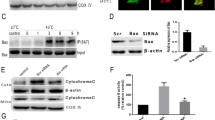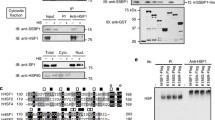Abstract
Chinese hamster lung fibroblasts V79 cells were treated with heat stress for 4 weeks with short duration (15 min) heat shock every alternate day in culture. It was observed that Hsp 70 and the antioxidant enzyme MnSOD became overexpressed during the chronic heat stress period. Both p38 MAPK and Akt became phosphorylated by chronic heat stress exposure. Simultaneous exposure to SB203580, a potent and specific p38MAPK inhibitor drastically inhibited the phosphorylation of p38MAPK and Akt. Furthermore, exposure to SB203580 also blocked the increase in Hsp70 and MnSOD levels and the elevated SOD activity brought about by chronic heat stress. Heat shock factor 1 (HSF1) transcriptional activity and nuclear translocation of HSF1 were prominently augmented by chronic heat stress, and this amplification is markedly reduced by concomitant exposure to SB203580. Also, activations of p38MAPK and Akt and upregulations of Hsp70 and MnSOD were observed on exposure to heat shock for a single exposure of longer duration (40 min). siRNA against p38MAPK notably reduced Akt phosphorylation by single exposure to heat stress and drastically diminished the rise in Hsp70 and MnSOD levels. Similarly, siRNA against Akt also eliminated the augmentation in Hsp70 and MnSOD levels but p38MAPK levels remained unaffected. Heat stress produced reactive oxygen species (ROS) in V79 fibroblasts. N-acetyl cysteine blocked the increase in phosphorylation of p38MAPK, amplification of Hsp70, and MnSOD levels by heat stress. Therefore, we conclude that heat stress-activated p38MAPK which in turn activated Akt. Akt acted downstream of p38MAPK to increase Hsp70 and MnSOD levels.
Concise summary: Thermal injury of the skin over a long period of time has been associated with development of cancerous lesions. Also, in many cancers, the cytoprotective genes Hsp70 and MnSOD have been found to be overexpressed. Therefore, we considered it important to identify the signaling elements upstream of the upregulated survival genes in heat stress. We conclude that heat stress activated p38MAPK which in turn activated Akt. Akt mediated an augmentation in Hsp70 and MnSOD levels working downstream of p38MAPK.






Similar content being viewed by others
Abbreviations
- ROS:
-
Reactive oxygen species
- Hsp:
-
Heat shock protein
- MnSOD:
-
Manganese superoxide dismutase
- HSF1:
-
Heat shock factor 1
- NFKB:
-
Nuclear factor kappa B
- CREB:
-
cAMP response element-binding protein
- AP1:
-
Activator protein 1
- MAPK:
-
Mitogen-activated protein kinase
References
Arya R, Mallik M, Lakhotia SC (2007) Heat shock genes-integrating cell survival and death. J Biosci 32:595–610
Aziz SA, Hussain KS, Khan NA, Mushtaq A, Kharadi MY, Bhat JR (1998) Profile of Kangari cancer: a prospective study. Burns 24:763–766
Calderwood SK, Ciocca DR (2008) Heat Shock Proteins: Stress proteins with Janus-like properties in cancer. Int J Hypertherm 24:31–39
Calderwood SK, Khaleque MA, Sawyer DB, Ciocca DR (2006) Heat shock proteins in cancer:chaperones of tumorigenesis. Trends Biochemic Sci 31:164–172
Chakraborty PK, Banerjee Mustafi S, Ganguly S, Chatterjee M, Raha S (2008a) Resveratrol induces apoptosis in K562 (Chronic myelogenous leukemia) cells by targeting a key survival protein Hsp70. Cancer Sc 99:1109–1116
Chakraborty PK, Banerjee Mustafi S, Raha S (2008b) Pro-survival effects of repetitive low-grade oxidative stress are inhibited by simultaneous exposure to Resveratrol. Pharmacol Res 58:281–289
Cuenda A, Rousseau S (2007) p38 MAP-Kinases pathway regulation function and role in human diseases. Biochem Biophys Acta 1773:1358–1375
Dorion S, Lambert H, Landry J (2002) Activation of the p38 signaling pathway by heat shock involves the dissociation of glutathione S-transferase Mu from Ask1. J Biol Chem 277:30792–30797
Dröge W (2002) Free radicals in the physiological control of cell function. Physiol Rev 82:47–95
Goligorsky MS (2001) The concept of cellular “fight-or-flight” reaction to stress. Am J Physiol Renal Physiol 280:F551–F561
Han J, Sun P (2007) The pathways to tumor suppression via route p38. Trends Biochemic Sc 32:364–371
Hu H, Luo ML, Du XL, Feng YB, Zhang Y, Shen XM, Xu X, Cai Y, Han YL, Wang MR (2007a) Up-regulated manganese superoxide dismutase expression increases apoptosis resistance in human esophageal squamous cell carcinomas. Chin Med J 120:2092–2098
Hu Y, Jin H, Du X, Xiao C, Luo D, Wang B, She R (2007b) Effects of chronic heat stress on immune responses of the foot-and-mouth disease DNA vaccination. DNA Cell Biol 26:619–626
Ilangovan G, Venkatakrishnan CD, Bratasz A, Osinbowale S, Cardounel AJ, Zweier JL, Kuppusamy P (2006) Heat shock-induced attenuation of hydroxyl radical generation and mitochondrial aconitase activity in cardiac H9c2 cells. Am J Physiol Cell Physiol 290:313–324
Jiang B, Liang P, Zhang B, Huang X, Xio X (2008) Enhancement of PPAR-β activity by repetitive low-grade H2O2 stress protects human umbilical vein endothelial cells from subsequent oxidative stress-induced apoptosis. Free Radical Biol Med 46:555–563 doi:10.1016/j.freeradbiomed.2008.10.051
Johnson GL, Lapadat R (2002) Mitogen-activated protein kinase pathways mediated by ERK, JNK, and p38 protein kinases. Science 298:1911–1922
Jolly C, Morimoto RI (2000) Role of the heat shock response and molecular chaperones in oncogenesis and cell death. J NatlCancer Inst 92:1564–1572
Kim HP, Wang X, Zhang J, Suh GY, Benjamin IJ, Ryter SW, Choi AM (2005a) Heat shock protein-70 mediates the cytoprotective effect of carbon monoxide: involvement of p38β MAPK and heat shock factor-1. J Immunol 175:2622–2629
Kim HS, Skurk C, Maatz H, Shiojima I, Ivashchenko Y, Yoon SW, Park YB, Walsh K (2005b) Akt/FOXO3a signaling modulates the endothelial stress response through regulation of heat shock protein 70 expression. FASEB J 19:1042–1044
Kiningham KK, Cardozo ZA, Cook C, Cole MP, Stewart JC, Tassone M, Coleman MC, Spitz DR (2008) All-trans-retinoic acid induces manganese superoxide dismutase in human neuroblastoma through NF-κB. Free Radical Biol Med 44:1610–1616
Lu Q, Wen J, Zhang H (2007) Effect of chronic heat exposure on fat deposition and meat quality in two genetic types of chicken. Poult Sci 86:1059–1064
Maridonneau-Parini I, Clerc J, Polla BS (1988) Heat shock inhibits NADPH oxidase in human neutrophils. Biochem Biophys Res Commun 154:179–186
Maridonneau-Parini I, Malawista SE, Stubbe H, Russo-Marie F, Polla BS (1993) Heat shock in human neutrophils: superoxide generation is inhibited by a mechanism distinct from heat-denaturation of NADPH oxidase and is protected by heat shock proteins in thermotolerant cells. J Cell Physiol 156:204–211
Mattson D, Bradbury MC, Bisht KS, Curry HA, Spitz DR, Gius D (2004) Heat shock and the activation of AP-1and inhibition of NFҝB DNA binding activity. Possible role of intracellular redox status. Int J Hypertherm 20:224–233
Mayer MP, Bukau B (2005) Hsp70 chaperones: cellular functions and molecular mechanism. Cell Mol Life Sci 62:670–684
Odongo NE, AlZahal O, Lindinger MI, Duffield TF, Valdes EV, Terrell SP, McBride BW (2006) Effects of mild heat stress and grain challenge on acid-base balance and rumen tissue histology in lambs. J Anim Sci 84:447–455
Pelicano H, Carney D, Huang P (2004) ROS stress in cancer cells and therapeutic implications. Drug Resist Update 7:97–110
Pirkkala L, Nykanen P, Sistonen L (2001) Roles of the heat shock transcription factors in regulation of the heat shock response and beyond. FASEB J 15:1118–1131
Rafiee P, Theriot ME, Nelson VM, Heidemann J, Kanaa Y, Horowitz SA, Rogaczewski A, Johnson CP, Ali I, Shaker R, Binion DG (2006) Human esophageal microvascular endothelial cells respond to acidic pH stress by PI3K/AKT and p38 MAPK-regulated induction of Hsp70 and Hsp27. Am J Physiol Cell Physiol 291:931–945
Schimmel M, Bauer G (2002) Proapoptotic and redox state-related signaling of reactive oxygen species generated by transformed fibroblasts. Oncogene 21:5886–5896
Sen P, Mukherjee S, Ray D, Raha S (2003) Involvement of the Akt signaling pathway with disease processes. Mol Cell Biochem 253:241–246
Sen P, Chakraborty PK, Raha S (2005) p38 mitogen-activated protein kinase (p38MAPK) upregulates catalase levels in response to low dose H2O2 treatment through enhancement of mRNA stability. FEBS Lett 579:4402–4406
Shilo S, Pardo M, Aharoni-Simon M, Glibter S, Tirosh O (2008) Selenium supplementation increases liver MnSOD expression: molecular mechanism for hepato-protection. J Inorganic Biochem 102:110–118
Shin MH, Moon YJ, Seo JE, Lee Y, Kim KH, Chung JH (2008) Reactive oxygen species produced by NADH oxidase, Xanthine oxidase and mitochondrial electron transport system mediate heat shock- induced MMP-1 and MMP-9 expression. Free Radical Biol Med 44:635–645
Stathopoulou K, Gaitanaki C, Beis I (2006) Extracellular pH changes activate the p38-MAPK signalling pathway in the amphibian heart. J Exp Biol 209:1344–1354
Tekin D, Xi L, Zhao T, Tejero-Taldo ML, Atluri S, Kukreja RC (2001) Mitogen-activated protein kinases mediate heat shock-induced delayed protection in mouse heart. Am J Physiol Heart Circ Physiol 281:H523–532
Turrens JF (2003) Mitochondrial formation of reactive oxygen species. J Physiol 552:335–344
Uehara T, Kaneko M, Tanaka S, Okuma Y, Nomura Y (1999) Possible involvement of p38MAP kinase in Hsp70 expression induced by hypoxia in rat primary astrocytes. Brain Res 823:226–230
Vega ML, Huerta-Yepaz S, Garban H, Zazirehi A, Emmanouilides C, Bonavida B (2004) Rituximab inhibits p38MAPK activity in 2F7BNHL and decreases IL-10 transcription: pivotal role of p38MAPK in drug resistance. Oncogene 23:3530–3540
Yamashita N, Hoshida S, Nishida M, Igarashi J, Taniguchi N, Tada M, Kuzuya T, Hori M (1997) Heat shock-induced manganese superoxide dismutase enhances the tolerance of cardiac myocytes to hypoxia–reoxygenation injury. J Mol Cell Cardiol 29:1805–1813
Zhang HJ, Xu L, Drake VJ, Xie L, Oberley LW, Kregel KC (2003) Heat-induced liver injury in old rats is associated with exaggerated oxidative stress and altered transcription factor activation. FASEB J 17:2293–2295
Zhang J, Shen B, Lin A (2007) Novel strategies for inhibition of the p38 MAPK pathway. Trends Pharmacologic Sci 28:286–295
Acknowledgement
We thank Dr. Swasti Roy Choudhuri, Structural Genomics section of our institute for his excellent help and guidance with the confocal microscopy. Partial financial support from grant no. SR/SO/HS-23/2003 from Department of Science and Technology, Government of India is acknowledged.
Author information
Authors and Affiliations
Corresponding author
Rights and permissions
About this article
Cite this article
Banerjee Mustafi, S., Chakraborty, P.K., Dey, R.S. et al. Heat stress upregulates chaperone heat shock protein 70 and antioxidant manganese superoxide dismutase through reactive oxygen species (ROS), p38MAPK, and Akt. Cell Stress and Chaperones 14, 579–589 (2009). https://doi.org/10.1007/s12192-009-0109-x
Received:
Revised:
Accepted:
Published:
Issue Date:
DOI: https://doi.org/10.1007/s12192-009-0109-x




